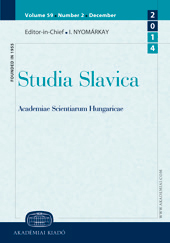Nieuświadomione dziedzictwo? Ukryte analogie w twórczości Milana Kundery i Karla Čapka
Unconscious heritage? Hidden analogies in the works of Milan Kundera and Karl Čapek
Author(s): Agnieszka Janiec-NyitraiSubject(s): Czech Literature, Interwar Period (1920 - 1939), Theory of Literature
Published by: Akadémiai Kiadó
Keywords: Karel Čapek; Milan Kundera; Czech literature; literary heritage; analogies;
Summary/Abstract: This article is devoted to certain themes, problems, and motifs known as key questions in the literary heritage of the interwar period Czech writer Karel Čapek, which can be seen in Milan Kundera’s prose as well. The author depicts and briefly characterizes the most important points of contact in the works of these two prominent writers, focusing on narrative similarities and examining analogies which appear at the semantic level: a search for identity, a fascination with diversity and difference, or the concept of “unrealized lives”, to name only a few. Another important aspect of the study is the question of searching for the truth and its ambiguity, which is the key problem in Čapek’s works, and it also plays a very important role in Kundera’s prose. Finally, the theme of ambiguous and unstable identity is also explored, the identity that constantly changes under the influence of the “watchful gaze of others”.
Journal: Studia Slavica Academiae Scientiarum Hungaricae
- Issue Year: 61/2016
- Issue No: 2
- Page Range: 425-436
- Page Count: 12
- Language: Polish
- Content File-PDF

